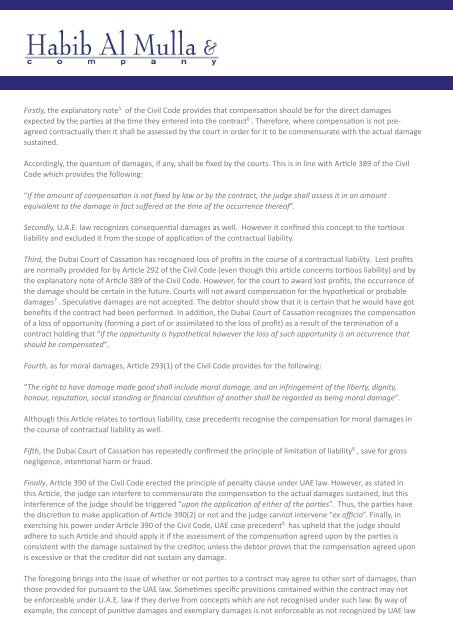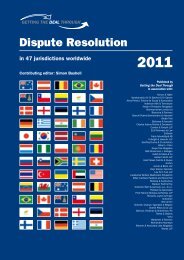Damages under UAE Law in the context of - Habib Al Mulla
Damages under UAE Law in the context of - Habib Al Mulla
Damages under UAE Law in the context of - Habib Al Mulla
Create successful ePaper yourself
Turn your PDF publications into a flip-book with our unique Google optimized e-Paper software.
Firstly, <strong>the</strong> explanatory note 5 <strong>of</strong> <strong>the</strong> Civil Code provides that compensation should be for <strong>the</strong> direct damages<br />
expected by <strong>the</strong> parties at <strong>the</strong> time <strong>the</strong>y entered <strong>in</strong>to <strong>the</strong> contract 6 . Therefore, where compensation is not preagreed<br />
contractually <strong>the</strong>n it shall be assessed by <strong>the</strong> court <strong>in</strong> order for it to be commensurate with <strong>the</strong> actual damage<br />
susta<strong>in</strong>ed.<br />
Accord<strong>in</strong>gly, <strong>the</strong> quantum <strong>of</strong> damages, if any, shall be fixed by <strong>the</strong> courts. This is <strong>in</strong> l<strong>in</strong>e with Article 389 <strong>of</strong> <strong>the</strong> Civil<br />
Code which provides <strong>the</strong> follow<strong>in</strong>g:<br />
“If <strong>the</strong> amount <strong>of</strong> compensation is not fixed by law or by <strong>the</strong> contract, <strong>the</strong> judge shall assess it <strong>in</strong> an amount<br />
equivalent to <strong>the</strong> damage <strong>in</strong> fact suffered at <strong>the</strong> time <strong>of</strong> <strong>the</strong> occurrence <strong>the</strong>re<strong>of</strong>”.<br />
Secondly, U.A.E. law recognizes consequential damages as well. However it conf<strong>in</strong>ed this concept to <strong>the</strong> tortious<br />
liability and excluded it from <strong>the</strong> scope <strong>of</strong> application <strong>of</strong> <strong>the</strong> contractual liability.<br />
Third, <strong>the</strong> Dubai Court <strong>of</strong> Cassation has recognized loss <strong>of</strong> pr<strong>of</strong>its <strong>in</strong> <strong>the</strong> course <strong>of</strong> a contractual liability. Lost pr<strong>of</strong>its<br />
are normally provided for by Article 292 <strong>of</strong> <strong>the</strong> Civil Code (even though this article concerns tortious liability) and by<br />
<strong>the</strong> explanatory note <strong>of</strong> Article 389 <strong>of</strong> <strong>the</strong> Civil Code. However, for <strong>the</strong> court to award lost pr<strong>of</strong>its, <strong>the</strong> occurrence <strong>of</strong><br />
<strong>the</strong> damage should be certa<strong>in</strong> <strong>in</strong> <strong>the</strong> future. Courts will not award compensation for <strong>the</strong> hypo<strong>the</strong>tical or probable<br />
damages 7 . Speculative damages are not accepted. The debtor should show that it is certa<strong>in</strong> that he would have got<br />
benefits if <strong>the</strong> contract had been performed. In addition, <strong>the</strong> Dubai Court <strong>of</strong> Cassation recognizes <strong>the</strong> compensation<br />
<strong>of</strong> a loss <strong>of</strong> opportunity (form<strong>in</strong>g a part <strong>of</strong> or assimilated to <strong>the</strong> loss <strong>of</strong> pr<strong>of</strong>it) as a result <strong>of</strong> <strong>the</strong> term<strong>in</strong>ation <strong>of</strong> a<br />
contract hold<strong>in</strong>g that “if <strong>the</strong> opportunity is hypo<strong>the</strong>tical however <strong>the</strong> loss <strong>of</strong> such opportunity is an occurrence that<br />
should be compensated”.<br />
Fourth, as for moral damages, Article 293(1) <strong>of</strong> <strong>the</strong> Civil Code provides for <strong>the</strong> follow<strong>in</strong>g:<br />
“The right to have damage made good shall <strong>in</strong>clude moral damage, and an <strong>in</strong>fr<strong>in</strong>gement <strong>of</strong> <strong>the</strong> liberty, dignity,<br />
honour, reputation, social stand<strong>in</strong>g or f<strong>in</strong>ancial condition <strong>of</strong> ano<strong>the</strong>r shall be regarded as be<strong>in</strong>g moral damage”.<br />
<strong>Al</strong>though this Article relates to tortious liability, case precedents recognise <strong>the</strong> compensation for moral damages <strong>in</strong><br />
<strong>the</strong> course <strong>of</strong> contractual liability as well.<br />
Fifth, <strong>the</strong> Dubai Court <strong>of</strong> Cassation has repeatedly confirmed <strong>the</strong> pr<strong>in</strong>ciple <strong>of</strong> limitation <strong>of</strong> liability 8 , save for gross<br />
negligence, <strong>in</strong>tentional harm or fraud.<br />
F<strong>in</strong>ally, Article 390 <strong>of</strong> <strong>the</strong> Civil Code erected <strong>the</strong> pr<strong>in</strong>ciple <strong>of</strong> penalty clause <strong>under</strong> <strong>UAE</strong> law. However, as stated <strong>in</strong><br />
this Article, <strong>the</strong> judge can <strong>in</strong>terfere to commensurate <strong>the</strong> compensation to <strong>the</strong> actual damages susta<strong>in</strong>ed, but this<br />
<strong>in</strong>terference <strong>of</strong> <strong>the</strong> judge should be triggered “upon <strong>the</strong> application <strong>of</strong> ei<strong>the</strong>r <strong>of</strong> <strong>the</strong> parties”. Thus, <strong>the</strong> parties have<br />
<strong>the</strong> discretion to make application <strong>of</strong> Article 390(2) or not and <strong>the</strong> judge cannot <strong>in</strong>tervene “ex <strong>of</strong>ficio”. F<strong>in</strong>ally, <strong>in</strong><br />
exercis<strong>in</strong>g his power <strong>under</strong> Article 390 <strong>of</strong> <strong>the</strong> Civil Code, <strong>UAE</strong> case precedent 9 has upheld that <strong>the</strong> judge should<br />
adhere to such Article and should apply it if <strong>the</strong> assessment <strong>of</strong> <strong>the</strong> compensation agreed upon by <strong>the</strong> parties is<br />
consistent with <strong>the</strong> damage susta<strong>in</strong>ed by <strong>the</strong> creditor, unless <strong>the</strong> debtor proves that <strong>the</strong> compensation agreed upon<br />
is excessive or that <strong>the</strong> creditor did not susta<strong>in</strong> any damage.<br />
The forego<strong>in</strong>g br<strong>in</strong>gs <strong>in</strong>to <strong>the</strong> issue <strong>of</strong> whe<strong>the</strong>r or not parties to a contract may agree to o<strong>the</strong>r sort <strong>of</strong> damages, than<br />
those provided for pursuant to <strong>the</strong> <strong>UAE</strong> law. Sometimes specific provisions conta<strong>in</strong>ed with<strong>in</strong> <strong>the</strong> contract may not<br />
be enforceable <strong>under</strong> U.A.E. law if <strong>the</strong>y derive from concepts which are not recognised <strong>under</strong> such law. By way <strong>of</strong><br />
example, <strong>the</strong> concept <strong>of</strong> punitive damages and exemplary damages is not enforceable as not recognized by <strong>UAE</strong> law



